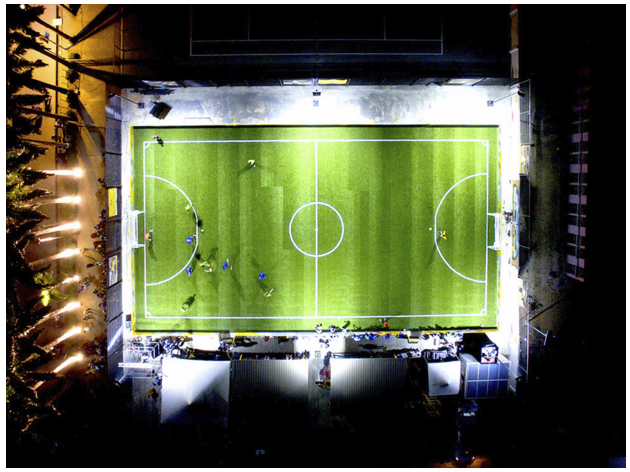
Africa’s 1st Solar & Kinetic Powered Soccer Pitch
Africa is increasingly becoming known for its green energy initiatives, from wind farms in Kenya to solar power plants in Rwanda. The latest green energy breakthrough comes from Lagos, where the world’s first solar and kinetic energy powered soccer field was just built.
Opened last month, the field is located at the Federal College of Education in Akoka. Constructed with a layer of tiles under the turf that transform players’ footfalls into kinetic energy that helps light up the field at night, this renewable field is a great example of out of the box thinking when it comes to the possible applications for green energy technology.
Launched as an initiative between energy company Shell, the rapper Akon and London-based startup Pavegen, the field is the culmination of three years of teamwork and collaboration. Pavegen is responsible for the 100 rubber paving tiles that capture and convert footfall energy to light floodlights around the stadium. The startup’s goal is to provide low cost energy effective solutions in Africa, and the field in Lagos marks their biggest application to date.
Combined with solar panels, the kinetic tiles can power streetlights around the field for a full 24 hours—ensuring that night games are played safely. A soccer field is a great application for this technology, which requires an area to have heavy foot traffic. Other potential applications could be in schools or shopping centers.
Rapper Akon has also made great strides in bringing awareness to the need for electricity in Africa through his foundation, Akon Lighting Africa. Launched in 2014, the foundation seeks to support grassroots efforts to bring solar energy to rural areas in Africa. To date they have brought projects to life in 14 African nations.
While this is Africa’s first people-powered field, it’s actually the second venture between Shell and Pavegen. The first field, completed in 2014, allows children in Rio de Janeiro to play safely at night by light provided by their footfalls. Legendary Brazilian soccer star Pele was on hand for the inauguration, praising not only the country’s rich soccer heritage, but also the value of using science to power the solutions of the future.
Pavegen has big ambitions for their tiles. With production methods still being refined (which will bring the cost of the tiles down), in the future we might see entire stadiums paved with these tiles. Not only would player momentum create energy, but imagine the collective energy that could be harnessed from a hundred thousand fans celebrating a goal in the stands. The future for this innovative application of green technology is certainly shining bright.
Photo credits: Pavegen
